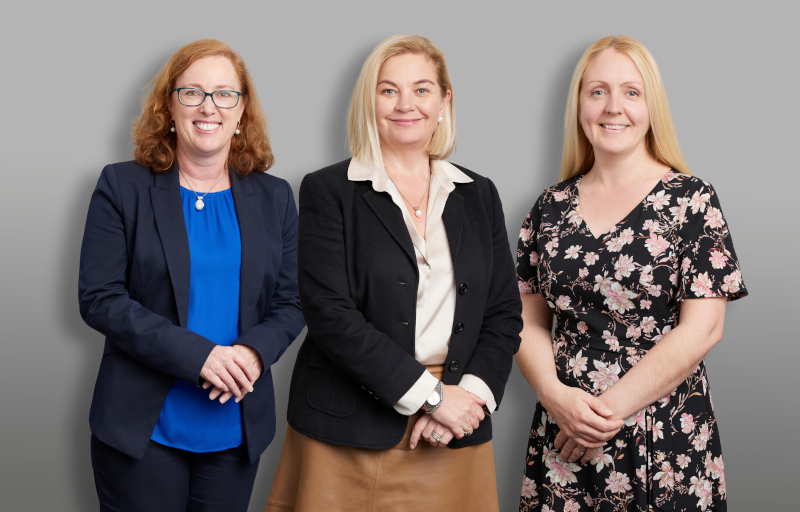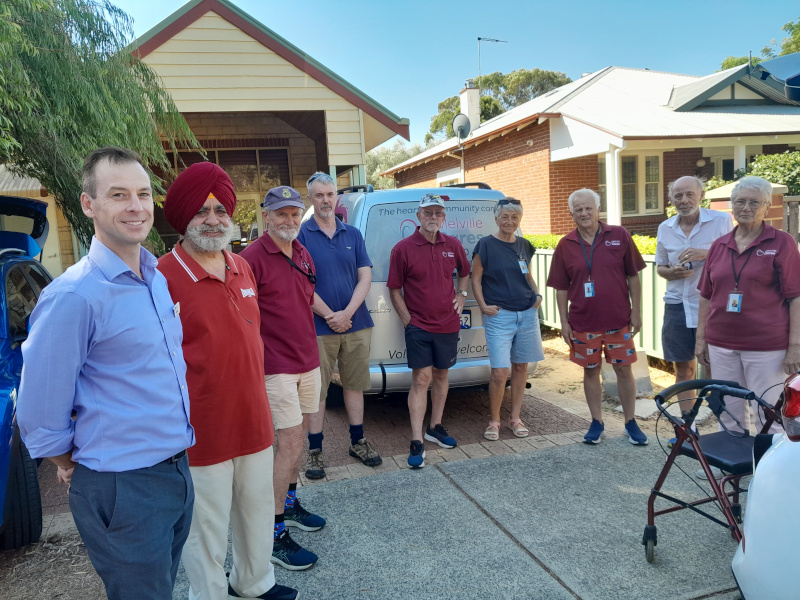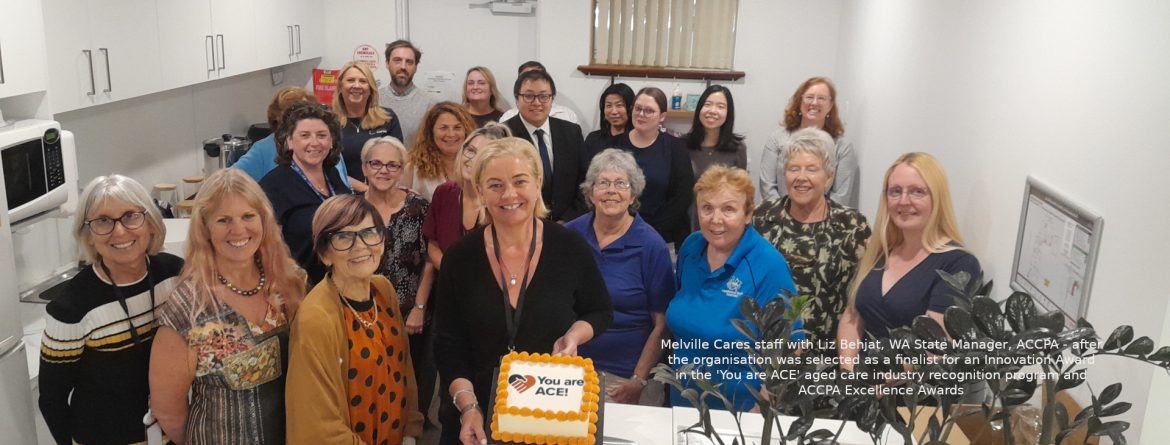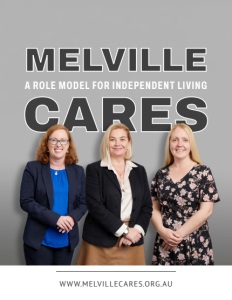Melville Cares
A Role Model for Independent Living
Empowering Dignified Ageing and Independence
As Australia faces an ageing population and increasing demands on its healthcare system, organisations like Melville Cares are stepping up to provide vital support that allows older adults to live independently in their own homes. Under the leadership of CEO Maria Davison, Melville Cares has grown from a small, locally focused initiative into a cornerstone of community-based aged care, serving nearly 2,000 clients across the region. With almost four decades of experience, the organisation is responding to its clients’ immediate needs and paving the way for innovative, sustainable models of care that prioritise dignity, autonomy, and community connection.
Origins and evolution
Melville Cares was founded nearly 40 years ago by June Barton, a former mayor of Melville, who identified a growing need for in-home support for the elderly. “It was a recognition that older people needed more support at home,” Davison explains, reflecting on the organisation’s humble beginnings. Over the years, Melville Cares has evolved to offer a wide range of services that cater to the diverse needs of its clients, from basic domestic assistance to complex end-of-life care.
Today, the organisation remains deeply rooted in its original mission: to help people live at home and well. “Our whole purpose is to enable individuals to maintain their independence while receiving the care they need in the comfort of their own homes,” Davison emphasises. This mission has guided Melville Cares through decades of growth and change, allowing it to adapt to the evolving aged care landscape while staying true to its community-centric values.

Tailored to individual needs
Melville Cares provides a comprehensive array of services, largely funded by the federal government, tailored to meet each client’s specific needs. The journey with Melville Cares often begins with essential services such as transport and domestic assistance. However, as clients’ needs become more complex, the care provided by the organisation expands to include medication support, nursing care, and comprehensive case management, ensuring all aspects of a client’s care are covered.
“Our nursing team provides clinical services and supports clients living independently at home,” Davison explains. “We have an allied health team that includes physiotherapists, occupational therapists, and social workers, all working together to promote health and well-being.”
One of the organisation’s key focus areas is end-of-life planning, a critical yet often overlooked aspect of care. Melville Cares in partnership with Professor Davina Porock at Edith Cowan University is developing an advanced care planning process that goes beyond traditional medical directives to address personal wishes and preferences. “It’s essentially an end-of-life action plan,” Davison notes. “This plan covers everything from medical treatment preferences to personal choices, like who should be present at the end of life or ensuring that pets can stay with their owners.”
Challenges in the aged care sector
The aged care sector in Australia is currently facing significant challenges, many of which stem from the federal government’s dual role as both the primary funder and the regulator of services. This complex dynamic creates a challenging environment for organisations like Melville Cares, which must navigate stringent regulations while striving to meet the growing service demand.
“Our main funder is also our regulator, which creates a dynamic and somewhat challenging environment to work in,” Davison acknowledges. She points out that while the government provides approximately 98% of the funding for aged care, this model is becoming increasingly unsustainable as the population ages and workforce availability struggles to keep pace with demand.
In Australia, a high proportion of older adults enter residential aged care—a trend that Davison believes is both costly and unsustainable in the long term. “The workforce is not keeping up, and the cost is immense,” she warns. To address these issues, a system of co-contributions is proposed, where those who can afford to contribute to their care will be required to do so. However, implementing these changes has been delayed, leaving many providers in a precarious financial position.
Innovating for better care
Despite these challenges, Melville Cares remains committed to innovation and continuous improvement. The organisation focuses on preventing falls, a leading cause of loss of independence among older adults. “If we’re going to help people live at home well, we need to address the greatest risks,” Davison explains. This focus on fall prevention has led to significant investments in allied health services and partnerships with institutions like Edith Cowan University, where research into fall prevention strategies is ongoing.
Another strategic priority has been providing services into collocate living where we have a partnership with Alchera Living. The benefits for residents in collocated living such as retirement villages are clear with reduced social isolation, reduced hospital admissions as well as an increased sense of wellbeing. Being an onsite provider of cares brings the benefits of familiar staff, quick responses and best use of resources. With more older people wanting to stay living at home we see this as a great alternative giving peace of mind, great amenities and the opportunity to keep social and active in a purpose built environment while still a home that’s yours.
One of the most significant technological advancements currently being implemented by Melville Cares is a client portal, which allows clients and their families to manage care more effectively. “They’ll be able to see their schedule, who’s coming when, and even book services,” Davison explains. This technology is particularly beneficial for geographically dispersed families, allowing them to stay involved in their loved one’s care regardless of distance.
Expanding the Melville Cares model
Melville Cares’ success in the Melville area has increased service demand beyond its original geographic boundaries. In response, the organisation is set to expand its community-based model to new places. Melville Cares recently launched Western Suburbs Cares, bringing its proven approach to a new metropolitan area. “About 60 to 70 percent of the model will be the same, but the service will be tailored to the needs and feel of the new community,” Davison says.
This expansion reflects Melville Cares’ commitment to maintaining strong local connections, which are vital to the success of their model. “Most of our staff members come from the same community our clients live in, and that makes a big difference,” Davison notes. The organisation places a high value on local engagement, ensuring that both staff and clients feel connected to the community and each other.
Investing in technology
As it looks to the future, sustainability is a focus for Melville Cares. The organisation is exploring various strategies to ensure that it can continue providing high-quality care while reducing its environmental impact and enhancing operational efficiency. “Innovation will play a critical role in helping us meet these goals,” Davison explains. One simple yet impactful innovation is introducing a communication system that allows clients to manage their care through a digital portal. This empowers clients and reduces the administrative burden on staff, allowing them to focus on delivering high-quality care. “It’s about making care more accessible and more responsive to the needs of our clients,” Davison says.We’ve partnered with Bremmer to support us with data safety and integrity as well as support innovation and experimentation. We need a joint approach to truly innovate.

Melville Cares staff and volunteers being trained for transport duties
Strong governance and leadership
Melville Cares’ success is rooted in its commitment to strong governance and effective leadership. The organisation has cultivated a diverse and skilled board that provides the strategic insight needed to navigate the complex aged-care landscape. “Strong governance gives us the platform to examine our risk appetite and feel more comfortable exploring opportunities and making significant investments into the future” Davison explains. The collective Board skills and expertise are central to close monitoring of what drives success today along with a courageous but prudent appetite for expansion and innovation. In addition to their expertise all Board members have formal governance qualifications and a drive to ensure contemporary practise. Exemplifying excellence, last year, our Chair, Dr. Andrew Schox was a finalist in the Australian Institute of Company Directors, Director of the Year.
Aged care sector leadership requires a unique blend of commercial acumen and a deep commitment to client care. “We have to have both in this sector,” Davison asserts. This balance is essential for maintaining an engaged workforce and delivering consistent, high-quality care to clients.
Melville Cares strongly emphasises engagement, both with clients and staff. Davison believes meaningful engagement is key to the organisation’s success, ensuring that clients feel connected to the services they receive and that staff feel valued and supported in their roles. “Unless clients feel that they know who the CEO is, who decision-makers are, and have access to them, their ability to be connected to the service is tentative,” Davison says. Too often we make assumptions about how valued our services are but we need to have a regular, independent assessment. This supports us being able to praise team members, make improvements quickly and to know what else our clients and their families want to live well at home. It brings together our day to day services with our strategy going forward. We work with the team at Felicx to keep a real pulse on client sentiment to ensure that as we grow we don’t lose what makes us successful.
Empowering the frontline workforce
The team at Melville Cares, particularly those on the front lines of care, are the organisation’s backbone. “Our direct care team is the absolute face of Melville Cares,” Davison emphasizes. These team members are often clients’ daily point of contact and play a crucial role in building trusted relationships on top of which great, personalised care can be delivered.
Melville Cares maintains a flat organisational structure that minimises the levels between the CEO and team members to keep staff engaged and motivated. This approach fosters a culture of openness and accountability, ensuring team members feel heard and valued. “Our whole role here has got to be to make it easier for them to get on with what’s most important, their time with the client,” Davison explains.
Maria also strongly emphasises the need to recognise the diverse skill set required for frontline care. “Too often our direct care staff in this sector are mistakenly referred to as unskilled, and the irony is, there’s probably very few of us who could do that role,” Davison points out. These staff members are caregivers, counselors, social workers, and sometimes exercise physiologists. They have highly specialised skills in meeting the holistic needs of each client, a rare skill set.
A community-based model
As Melville Cares continues to expand and innovate, the organisation remains committed to its community-based model, which has proven effective and sustainable. This model is built on strong local connections, a deep understanding of the community’s needs, and a commitment to empowering clients and staff. Melville Cares is an aged care provider and also a resource to the broader community, offering advice and regular workshops and information sessions. ‘We want the community to be strengthened by us being a part of it’, says Maria.
Looking to the future, Melville Cares aims to continue refining and expanding this model, bringing its unique approach to new communities while maintaining the high standards of care that have made it a trusted provider for nearly four decades. “We want to continue to be a leader in aged care at home, offering innovative solutions that allow older people’s lives to be as fulfilling as at any other stage of life.’’ Davison concludes.
AT A GLANCE
Melville Cares
What: A community-based, not-for-profit organisation providing support services to older people and their caregivers to help them live independently and with dignity in their homes and communities.
Where: Melville, Western Australia
Website: https://melvillecares.org.au/
PREFERRED VENDORS
Bremmar – www.bremmar.com.au





 This information will never be shared to third parties
This information will never be shared to third parties